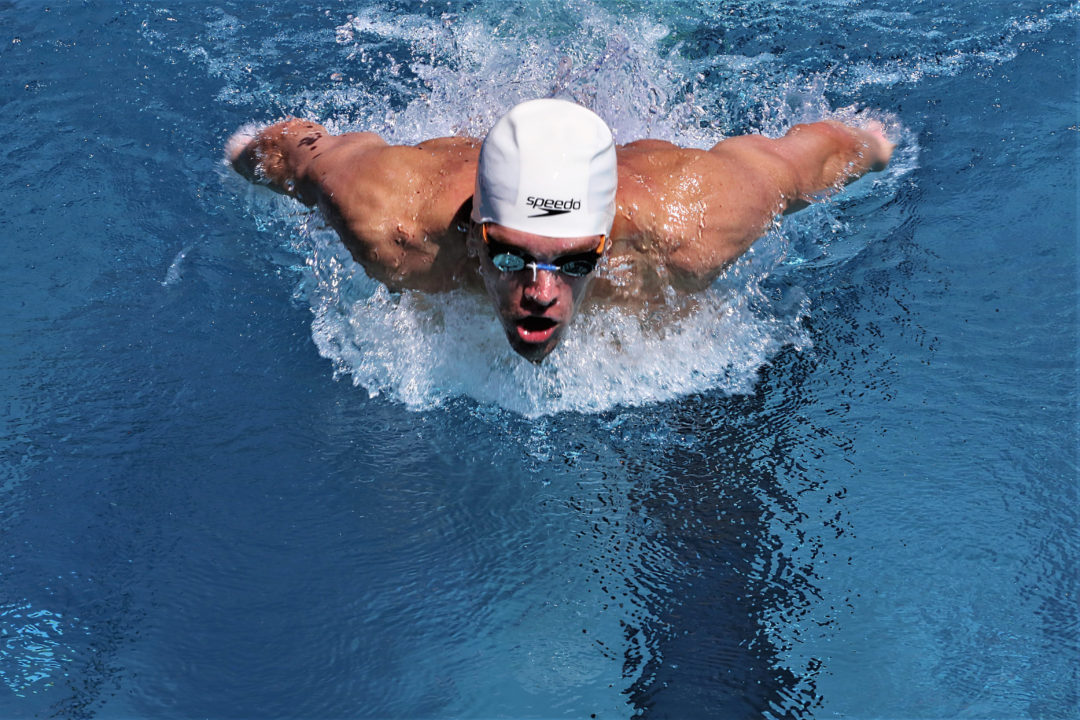Courtesy: David Sailer
First things first. I’m not an Olympian, never went to the World Championships. However I’ve been a competitive swimmer for the better part of the last 15+ years – multiple-time state and (youth) national champion in my home country of Austria – and most recently graduated summa cum laude with a PhD at age 26.
Here’s three lessons that I’ve learned on discipline, perseverance and patience throughout my journey of handling competitive swimming, next to a full-time job while doing a PhD.
I started swimming in the early 2000s, later specializing on the short-to-mid butterfly and freestyle distances and continued to swim competitively throughout high school as well as my two undergraduate and graduate studies. During my studies, I worked a part-time and later a full-time position.
In search of finding what’s right for me, I had to realize that the classical trajectory of other swimmers probably wasn’t mine. By using a combination of weight training, distance sets and high intensity USRPT-like training methods, I started and continued to register personal best times (e.g. 23.66 in the 50 free). So I kept at it while working towards my master’s degree; and ultimately my doctorate – handling a good deal of training by myself.
Whenever my teammates would go to morning practice, I’d use the morning hours to work on my thesis before the busyness of everyday life caught up with me. After that, working a full-time (non-university) job, I’d usually be spending the next 8+ hours in the office. And in the evenings, when my work colleagues would call it a day, I’d go swimming until 9 pm. Admittedly this was much harder during the winters, especially the last one.
Other times, mostly in spring, I would mix up the routine, catching the first rays of dawn during morning practice or squeezing in some high-intensity-swims of about 60 minutes during lunch break, only to later work on my doctoral thesis in the evening and night hours after a long day’s work.
Nevertheless – perseverance paid off. These were arguably some of the best four years of my swimming career. Most of the highlights – in and outside of the pool – as well as a whole bunch of PBs and championship titles fell in the years between 2016 and 2020.
Lesson one: It’s not about the effort you put in some days. It’s the consistency of effort, every day.
Unfortunately, people have a tendency of telling you that things are not possible. Sometimes they will even go to great lengths to actively hinder you. However, swimming competitively is a great teacher: there will be some victories, some more defeats. No matter. We move on and “treat those two imposters just the same” (Kipling).
Looking back it’s all about how we overcome obstacles. Difficulties and these tactless remarks just fuel our inner fire so that we may find that resilience in ourselves to keep on keeping on. And, in time, results will come – we just need to have a little patience.
Lesson two: Expect resistance. And then do it anyway.
Gradually, as I matured in the course of my doctorate, I fell in love with the sport again; not so much for the medals or PBs, but for that unique relationship we as swimmers have with the element of water – or in the words of Pindar (First Olympian Ode): aristŏn mĕn hydōr, meaning “the best indeed is water.” So I ended up writing my dissertation on the untold story of the cultural history of water. A book publication is scheduled for late 2020/early 2021.
Consistency of effort is as important for competitive swimming, as it is for pursuing a PhD, a job or really anything else in life. It’s also the best method that I’ve encountered for achieving one’s goals.
Let’s face it: our sport is hard. Really hard. Lots of sacrifices. You’re basically stuck in a pool all day, alone with your thoughts, and still have to perform. Asking “what’s my why” does help. Because life has a habit of manifesting itself around your focus – so never underestimate the power of autosuggestion.
Today we face unprecedented times of uncertainty. But we as swimmers are used to handling an element of fluidity. We’re capable of dealing with ambiguities, because we’ve proven it over and over again in training. In closing, I’d like to share with you an original thought, something a fellow colleague once told me: “Swimming is the best sport there is. If you can handle swimming – being all by yourself, alone in the water, and most of the time you don’t even have air around you – you will be able to handle everything else. Anything that life throws at you. Know that. And use it.”
And that’s really all there is for lesson three.
ABOUT DR. DAVID SAILER
David Sailer has been a competitive swimmer for the better part of the last 15 years, starting off at the age of 6 he learned swimming in a heated salt water pool at the French Riviera (Côte d’Azur). With the 2004 Olympic Games in Athens having a profound impact on the young man, he joined one of the then best swimming clubs nationwide. As nationally top ranked age grouper he specialized on the short-to-mid butterfly and freestyle distances – most notably 100 and 200 fly as well as the 400 free, where he achieved ranks in the European-Top 100 (at Junior age group level) –, later becoming a multiple state and (youth) national champion in his home country of Austria. With the water never completely letting go of him, he most recently graduated summa cum laude with a PhD at age 26 – with a dissertation on the untold story of the cultural history of water. That and his most recent PB of 23.66 in the 50 free make him arguably one of the fastest swimming PhDs worldwide.
